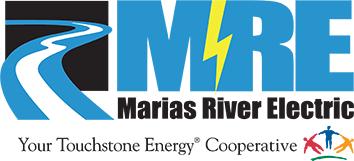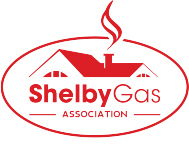Interconnection and Wheeling of Customer Generation Facilities
RESPONSIBILITY:
The General Manager shall be responsible for carrying out the provisions of this Policy, and may delegate certain responsibilities to staff members or consultants of the Cooperative.
PREAMBLE:
Marias River Electric Cooperative recognizes that our members may want to take advantage of alternative on-site generation sources. This policy outlines the means and requirements for interconnection and wheeling of this generation with the Marias River Electric Cooperative’s distribution lines. While this policy primarily assesses interconnection options, it is recognized that a member may generate without interconnecting to the Cooperative lines.
AVAILABILITY and REQUIREMENTS:
When a member desires to interconnect to the Cooperative’s grid the following requirements must be met:
- An interconnection and operating agreement outlining specific terms and conditions with the Cooperative is required.
- The Generation source may be renewable including but not limited to wind, solar, geothermal, hydropower or fuel cells.
- The generation to be wheeled may be required to meet the definition of “Qualifying Facility” (QF) as defined in the Public Utilities Regulatory Policy Act of 1978 (PURPA) and provided PURPA continues to be enforceable under federal law.
- A QF is generally defined as generation utilizing a renewable source or from cogeneration when energy that would otherwise be wasted is harnessed to generate electricity. QF is specifically defined by FERC Orders No. 70-70E, Order 499-499-A, Orders No. 575-575A and Order No. 593.
- Members desiring to wheel their member-owned generation that meets PURPA’s definition of “qualifying facilities” across the Cooperative’s distribution/transmission system shall meet the following guidelines:
- The Cooperative will not purchase power produced by the member.
- The generation may be stand alone or may provide part or all of the member’s own electrical requirements at the service.
- Metering shall be required that is capable of measuring flow in both directions, with energy and capacity measured consistent with the requirements of the affected systems.
- The Generator will be required to obtain capacity rights from all systems affected and is directly responsible for payment of associated charges.
- Charges for power delivered by the Cooperative shall be billed monthly at the appropriate rate.
- Payment for energy delivered by the member generator through the Cooperative system is not the responsibility of Cooperative.
- Charges from the Cooperative to the generator for wheeling shall be based on pro forma tariffs including a rate of return and payment of those charges is the responsibility of the generator.
- The Generator will be required to sign an interconnection and operating agreement with the Cooperative.
- Interconnection agreements must be consistent with the Cooperative’s all requirements wholesale power contracts.
- The Cooperative shall not be held responsible for damages in the event the Cooperative is unable to perform wheeling.
- Impacts on the Cooperative’s purchases of wholesale power shall be addressed including but not limited to:
- Costs of capacity (demand)
- Cost of imbalance
- Cost of scheduling
- Cost of voltage regulation
- Cost of other ancillary services if impacted
- Those transmission costs billed on a capacity basis
- An advance payment for engineering assessments will be required.
- The generator will be required to pay all reasonable costs incurred by the cooperative prior to interconnection for upgrades to the Cooperative’s system that are needed to maintain the power quality and system integrity.
- All policies and agreements need to be consistent and in coordination with the Distribution Cooperative’s Power suppliers with all requirement contracts.

